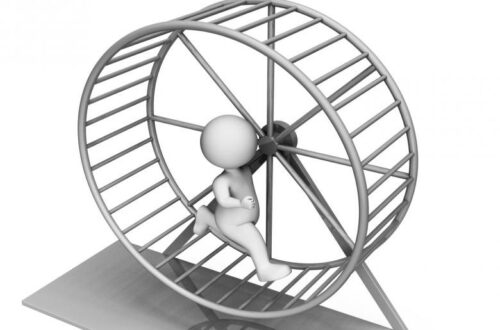
Why you should always keep asking ‘why?’
You may have noticed that I refer to myself as a “critical thinker” on the homepage of my website. That is not without reason. In my opinion critical thinking is one of the most important qualities that you can develop as a person. What does critical thinking entail? And why is it important?
In my opinion, critical thinking is above all an attitude: the willingness to put a question mark on everything, to question the obvious, and to wonder why things are the way they are. Not critical in the sense of dismissive or negative, but in the sense of asking critical questions. Or, as British philosopher Julian Baggini puts it, “to be appropriately skeptical without being indiscriminately cynical.”
Critical thinking means reflecting on your ideas and beliefs about yourself, life and the world. Taking nothing for granted, including your own beliefs, and instead forming your own judgment, determining for yourself what you want to believe or what you want to do.
Thinking critically, says Dutch philosopher Paul van Tongeren, automatically means breaking through the obviousness of it: “Obvious are the things you don’t think about. So thinking about things presupposes that they are no longer taken for granted. ” For a critical thinker nothing is self-evident – except for critical thinking itself.
Critical thinking therefore requires courage. Courage to question your own beliefs. To examine your assumptions and to subject your certainties to critical consideration. One of the consequences of this may be that you become less convinced of your ideas about yourself, life and the world around you.
You have formed these ideas in the course of your life, influenced by the environment in which you were born, the people who played a role in your life and the experiences you have had. We tend to consider them to be ‘normal’, we are used to them. Our habits and beliefs therefore seem self-evident, but they are not. In the words of the Swiss philosopher Peter Bieri, they are just “elements that we have simply picked up and become accustomed to through repetition.”
It is precisely what we consider ‘normal’ that is the subject of reflection for a critical thinker. Why do we do things a certain way? For what purpose and what assumptions is it based on? Where does a particular habit come from? Is what I think actually correct? Is my approach the best?
And what do we actually mean by certain concepts? Terms that we often use in daily life and we think we know what they mean. In fact, we assume that others understand the same. Until we question critically and it turns out that that may not be the case at all. What does ‘being happy’ really mean? When is something ‘righteous’? What is ‘success’?
Critical thinking requires a certain amount of open-mindedness. That you are able to see potentially positive aspects in a belief that you do not share or a position that is not yours. That you can see the pros and cons of different choices. An open attitude that allows you to look at things in a different way.
Critical thinking also requires that you can substantiate your opinion, belief or choices with arguments. It’s easy to have an opinion, but being able to substantiate it is something else. “Just because” or “because he or she did or said so” is the opposite of critical thinking.
Someone who thinks critically can not only express what he thinks, but also explain why. Argumentation, evidence and logical reasoning are prerequisites for this. A critical thinker will not just rely on the opinion or behavior of someone else. He only takes things as true when he has good reasons to do so.
Critical thinking is above all an attitude: the willingness to put a question mark on everything, to question the obvious, and to wonder why things are the way they are.
In an earlier article I wrote that that people conform massively to what the majority does or to the group to which they belong. They conform to what is considered ‘normal’, without asking themselves why. And that while we humans are fundamentally free, free to shape our lives as we see fit, to live our lives in a way that we find valuable ourselves. Critical thinking is an important aspect of that freedom.
According to British philosopher Bertrand Russell, a proponent of critical thinking, we need only conform to prevailing beliefs “as far as is necessary not to starve and not go to prison.” In all other cases, Russell argues, to conform without thinking for yourself is nothing more than “a voluntary submission to unnecessary tyranny.”
According to Russell, thinking critically instead of blindly conforming is an important precondition for a happy life itself. The way we live our lives must, according to Russell, stem from our own beliefs “and not from the casual preferences of those who happen to live next door or are related to us.”
In a world where the vast majority blindly conform themselves to their immediate environment, with the result that large groups of people display the same behavior, the same opinions, the same habits, etc., the critical thinker is often viewed strange when he calls into question what the people around him take for granted. The critical thinker is a disturber, someone who is “being difficult”.
The critical thinker will have to live with that. British philosopher John Stuart Mill has argued that it is important for people to be resilient “to the pressures of current opinions and beliefs, to society’s tendency to impose its ideas and habits on those who deviate from them.” Learning to think critically contributes to that resilience.
Critical thinking doesn’t just arm you against illogical conclusions, irrational choices or unreasonable positions. It is also an effective remedy for prejudice and stereotyping. Fact-free politics has no grip on someone who thinks critically. And critical thinking makes you resilient to political and religious indoctrination.
“Dare to think for yourself, against all authority,” the German enlightenment philosopher Immanuel Kant urged us. I admit, that’s not always easy. But thinking critically yourself contributes to living an authentic life: a life in which you make your own choices, freely and based on the values that are important to you, and your idea of how you want to live your life – regardless of what other people do.
The German philosopher Erich Fromm also believes that something should not be taken as true “only because an authority or the majority say so.” Fromm encourages us to have confidence in our own experience, observations and judgment, so that our beliefs are “rooted in an independent conviction based upon one’s own productive observing and thinking, in spite of the majority’s opinion.”
So yes, critical thinking can make you less convinced of your beliefs, deviate from those around you, or be perceived as being difficult. But on the other hand, critical thinking makes you resilient to peer pressure and indoctrination. And it makes you more aware of yourself, life and the world around you. Why you think what you think, why you make certain choices, why things are the way they are.
Therefore: Don’t take anything for granted. Reflect on your ideas and your beliefs. Dare to put a question mark on everything. Question the obvious. And above all: Always keep thinking for yourself. Always keep asking ‘why’. Always stay critical.




